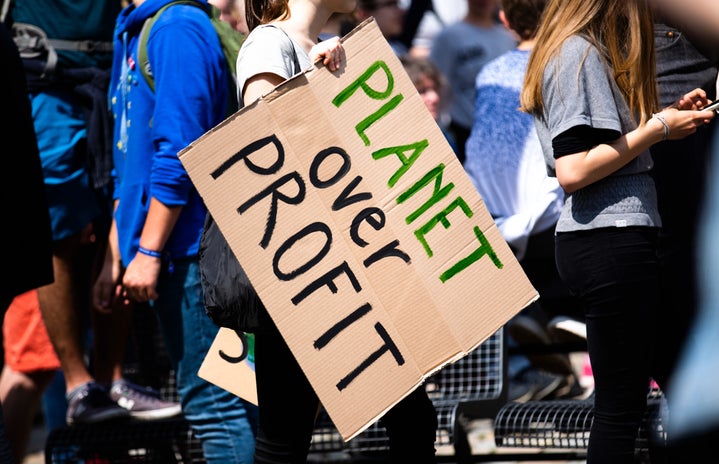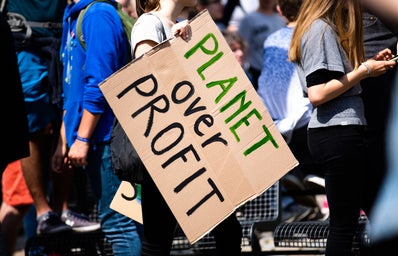The summer of 2020 was a tumultuous time. During the long lockdown months, the country had time to reflect on some of Britain’s most troubling societal issues, such as systemic racism. This was triggered by the death of George Floyd in Minneapolis, USA in May 2020. In June around 210,000 people took to the streets in the United Kingdom to protest for Black Lives Matter. The aim was to end police brutality towards black people and protest the wider consequences of racism within the country.
As well, whilst people were staying home to avoid contracting covid-19 the role humans have on the environment was made extremely clear. As people couldn’t drive their cars or fly in planes, the global annual energy-related CO2 emissions dropped to the lowest levels since the Second World War. Local wildlife made a comeback and nature areas flourished signifying the major impact of human activity on the environment. We had more time to educate ourselves on the climate crisis which sparked interest in environmentalist groups such as Extinction Rebellion.
We emerged from the pandemic more self-aware and hungry for real change leading to a noticeable increase in the number of protests taking place. However, our Conservative government and the former home secretary Priti Patel in particular, did not take to this wave of protesting all that well. In April of this year the Police, Crime, Sentencing and Courts Act 2022 was passed. The act means police have more ‘stop, search and seizure powers’, stronger ‘power to tackle disruptive protests’ and are equipped with more ‘powers and tools’. Fines and sentences have also been increased for disruption and protests to deter people from breaching these new rules. In simple terms, this has and will affect our right to protest and ‘have a serious impact on human rights’ according to Liberty.
Following the death of the late Queen Elizabeth II and the passing of the crown, the crack down on protesting has become very apparent. In Edinburgh at the accession proclamation of King Charles III a 22-year-old woman was arrested and charged for ‘disruption of peace’ whilst holding a small sign that said, “Fuck imperialism, abolish monarchy”. Another man in Oxford was detained for suspicion of ‘behaviour likely to cause harassment, alarm or distress under section 5 of the Public Order Act 1986’ after shouting: “Who elected him?” at Charles.
It seems for a democratic country we aren’t protecting our right to free speech and protest very well.
I’ve also been struck at the lack of coverage on protests and the negative view the media reports from. For example, the way most mainstream news outlets have reported on environmental protests has spurred on a disapproving mood amongst the public. Take the Indigo Rumbelow interview by Mark Austin on Sky News about the M25 protest. The boring and narrow line of questioning aimed at the Just Stop Oil protestor had him asking “why are the protests so disruptive?” Well, Mark, the very nature of a protest is to disrupt. If you have in fact been reading the news recently, which I hope you have considering it’s your job, you may have noticed that we are in the middle of a massive climate crisis! Apologies if there’s traffic on the M25 (as there is most of the time anyway) but these people are simply trying to get the government to enact legislative change to protect the planet and subsequently save humanity. For such a major issue I think radical action like blocking a motorway is perfectly justified.
He continued to state that the protest’s message was lost on the public which is totally false. The Guardian conducted an opinion poll where ‘66% of people supported taking nonviolent direct action to protect the UK’s nature’. What’s more, Just Stop Oil’s membership is steadily increasing, and attention is being drawn to the fact that the UK government is giving out new licences to drill for more oil at a time of rising global temperatures and sea levels. The presentation of these protests in certain news outlets demonstrates the country’s complacency when it comes to taking responsibility for its actions and being open to changing harmful practices.
The anti-protest act and the negative media coverage are part of a larger sinister problem within the country. We are in the midst of a culture war between what Tory MPs call the ‘woke mob’ and the right-wing government, as well as the billionaire-backed press. The ones in power don’t want to break traditions as the eventual need to change how our society functions will affect their incomes.
So, is our country heading into an era of authoritarianism, restricted protests, and lack of free speech? Hopefully not. But I do suggest if you feel passionate about an issue like the climate crisis or BLM but aren’t keen on getting arrested there are many other ways to support the cause. Get involved through the organisations’ websites and be on the right side of history.


